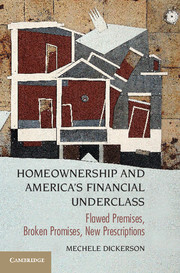 Homeownership and America's Financial Underclass
Homeownership and America's Financial Underclass Book contents
- Frontmatter
- Dedication
- Contents
- Acknowledgments
- 1 Chasing the American Dream
- 2 The Happy Homeownership Narrative
- 3 U.S. Support for Homeowners
- 4 The Homeownership Crisis
- 5 Homeowner Harm and the Blame Game
- 6 Flawed Premises
- 7 The Burden of Home Buying While Black or Latino
- 8 The Benefits of Home Buying While Black or Latino
- 9 Homeownership: Educational Disparities
- 10 Homeownership: Income Disparities
- 11 Outlook and Prescription for the Future
- Index
- References
11 - Outlook and Prescription for the Future
Published online by Cambridge University Press: 05 July 2014
- Frontmatter
- Dedication
- Contents
- Acknowledgments
- 1 Chasing the American Dream
- 2 The Happy Homeownership Narrative
- 3 U.S. Support for Homeowners
- 4 The Homeownership Crisis
- 5 Homeowner Harm and the Blame Game
- 6 Flawed Premises
- 7 The Burden of Home Buying While Black or Latino
- 8 The Benefits of Home Buying While Black or Latino
- 9 Homeownership: Educational Disparities
- 10 Homeownership: Income Disparities
- 11 Outlook and Prescription for the Future
- Index
- References
Summary
This book has presented a somber narrative of the road to homeownership for low- and moderate-income (LMI), black, and Latino Americans. The sobering statistics concerning their K–12 and college graduation rates, income and wealth levels, overall homeownership rates, and lower home appreciation rates contradict the rosy picture depicted in the Happy Homeownership Narrative. The Narrative’s portrayal of renters and homeowners matched the economic profiles of renters from the 1940s until the 1960s, who were encouraged and allowed to purchase homes with low-cost, government-insured mortgages. But homeownership is no longer easy, low-cost, or low-risk for LMI Americans. And the Happy Homeownership Narrative has never really applied to blacks and Latinos.
Homeownership is constantly pitched as the best way for LMI families to build wealth, and civil rights and housing advocacy groups view homeownership as the best way for blacks and Latinos to have financial stability. But it is now time for everyone – renters, homeowners, and U.S. politicians alike – to acknowledge and accept that the Happy Homeownership Narrative is based on false myths and assumptions and that many Americans should delay or avoid buying homes. Rather than encouraging renters to behave recklessly simply to elevate their status to homeowners, the United States needs to develop a coherent housing policy that enables LMI families to have affordable housing (be it owned or rented) and that acknowledges the link between housing and educational policies.
- Type
- Chapter
- Information
- Homeownership and America's Financial UnderclassFlawed Premises, Broken Promises, New Prescriptions, pp. 252 - 274Publisher: Cambridge University PressPrint publication year: 2014


